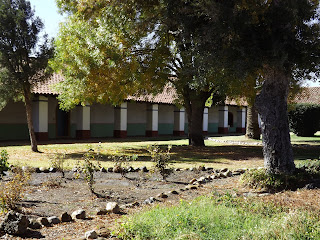The 21 California missions were
the first permanent European settlements to be founded on the West coast,
beginning in 1769.
Father Fermin Francisco de Lasuén
founded Mission San Miguel on July 25, 1797. Almost two years earlier, the site
was selected to close the gap between Mission San Antonio and Mission San Luis
Obispo. It was a beautiful spot on the Salinas River called Vahca by the
natives, Las Pozas by the Spaniards or "The Wells". The mission was
named for the "Most Glorious Prince of the Celestial Militia, Archangel
Saint Michael". Father Buenaventura Sitjar, the first administrator at Mission
San Miguel had ministered to the Salinan people for 25 years at Mission San
Antonio prior to his arrival at Mission San Miguel. Father Sitjar was fluent in
the Salinan language and baptized 15 youth the first day Mission San Miguel was
established.
A temporary church was built in
1797 but was lost to fire in 1806, at a time when more than one thousand
neophytes were living and working at Mission San Miguel. Preparation for a new
adobe church began soon after. Tiles and adobe blocks were made and stored for
10 years before the stone foundation of the church was laid in 1816. By 1821
the church was completed along with the interior frescos. A colonnade which leads to the church
contains twelve arches of different sizes and shapes, unique among the California
missions. The fountain in front of the
mission is not original (it was built in the 1940s); the design was adapted
from the fountain in Mission Santa Barbara.
Mission San Miguel never had a
traditional bell tower. In the mission era bells were hung from a wooden beam
in one of the archways. The bell which currently hangs there was cast in Mexico
City in 1800. A bell tower located inside the mission cemetery houses three bells,
the largest of which weighs 2,000 pounds and was recast in 1888 from six cracked
and broken bells from other missions. This bell tower was designed and built in
mid 1930s. The large bell is used to sound the Angelus. There is another bell
tower at San Miguel, a brick companario located on the south end of the mission
property. The bells which hang in it are not real, but cast in cement. This
bell tower was built in 1950s.
Mission San Miguel was
secularized in 1834 and put under the control of a civilian administrator and
at the time, there were only 30 Indians left at the mission. On July 4, 1846,
Petronillo Rios and William Reed took possession of the mission Buildings and
the Reed family occupied the recently abandoned mission. Following the murder
of 11 Reed family members and household staff, the mission rooms were converted
to commercial stores including a hotel, saloon, and retail shops. President Buchanan returned the mission
buildings and surrounding property to the Catholic Church in 1859. A resident
priest was assigned to Mission San Miguel in 1878 and the mission parish was
established.
On the morning of December 22,
2003 the coast was rocked by a 6.5 earthquake, the largest to strike the region
in over 50 years. Old Mission San
Miguel, located just 35 miles from the epicenter, was especially hard hit. All
of the Mission's buildings were rendered off-limits to the public. Numerous
cracks and fractures appeared in many of the Mission's walls. Entire sections
of plaster sloughed off, exposing the vulnerable adobe beneath to the
elements. It has since been restored.
The mission is now a novitiate
for training young Franciscan men. Many
parts of the mission are closed to the public.
This mission is also the home of the funniest parking lot signs I've ever seen:
Learn more about the missions and other great places to
visit along the coast in “Along the King’s Road: A Guide to Touring the
California Missions.” Get your copy today!






No comments:
Post a Comment
You are invited to join the conversation!
Please keep the following in mind when posting your comments:
- You do not need to register to comment
- You may comment anonymously
- You may post questions, and I will do my best to respond in a timely fashion.
- You may disagree. But please do so respectfully.
- I reserve the right to delete inappropriate or rude comments.
- You are the sole owner of your comments.
- You grant me license to publish your comments in another venue, royalty free and without limitations, including in a blog, book, video, or presentation.